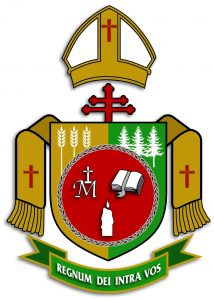HOMILY WEEK 29 04 – Year I
Living in Freedom as Children of God
(Rm 6:19-23; Ps 1; Lk 12:49-53)
*********************************************
“You were slaves of sin… and have become slaves of God.”
Slavery is not a word we like to hear. It brings to mind some of the worst abuses of humanity, including within our church. It seems the Jesuits in New York had slaves, and have recently apologized for that tragic reality. Slavery violates the matchless dignity of every person. Is St. Paul really saying slavery is okay? Of course not. Then what are we to make of this paradoxical statement?
Actually, the readings today are inviting us to live in freedom as children of God, in the kingdom of God inaugurated by Jesus Christ.
Unfortunately, the Romans Paul was writing to saw slavery as a fact of life. In the first century, as many as one in three people in the city of Rome was a slave. That was how so many magnificent historical structures we now enjoy were built – on the blood, sweat and tears of slaves. Imagine their misery. Given this reality of his times, Paul is speaking in human terms. Using a concept that they could relate to, he talks about being slaves to sin. They understood being held in bondage by a power greater than their own, with no rights at all. They had vivid images of people being compelled to obey even if they didn’t want to. And so, Paul used slavery as a way of explaining the power of sin.
Being slaves of God is an even harder image to understand. Paul is expressing the wholehearted, freely chosen obedience that God wants every one of God’s children to demonstrate. Just as slaves have only one master, so we believers should love and follow God alone, not “enslaving ourselves to sin” or to anything else. Sin, like addiction, is actually a form of slavery as well as idolatry, worshipping a false god. We know that God loves our free will and wants us to choose to obey him out of love, not out of fear of punishment.
Paul is trying to help the Romans understand the difference between being bound by our sinful tendencies, and being children of God wholly belonging to him. Paul wants them, and us, to understand that the “wages of sin is death, but the gift of God is eternal life in Christ Jesus our Lord.”
In a sense, Paul is redefining the word when he talks about our call to become “slaves to a God who loves us and has redeemed us.” He also redefines the word “master” when he tells us that God is a master who wants to set us free! In the end, it’s a beautiful paradox – we find our greatest freedom when we surrender ourselves to God. The more we submit to his will and his reign, the freer we become.
Step 3 of the AA program puts it this way: Made a decision to surrender our lives and our wills to the care of God as we understood God.” Surrendering is not giving up – it is a willing, giving in to a loving power greater than ourselves, which ultimately sets us free. May we never go back to living as a “slave” to sin!
In the gospel, Jesus uses mystical language to express the mystery of his mission – the fire he has come to set is precisely the inauguration of the kingdom of God here on earth. But because the world is so dysfunctional and set on doing its own will, the fire is also the purification, the burning away of all that is not of the kingdom, that must take place for the kingdom of God to be realized. This is why Jesus wants to cast a consuming fire on the earth. He wants to burn away all that is opposed to God’s desire for us. He has to clear the ground before something new can be built.
The baptism Jesus is to undergo is the way he will inaugurate that kingdom – his passion, death and resurrection. By becoming a crucified Messiah, he will transform suffering and death into a resurrection to eternal life.
Then Jesus also uses paradoxical language – speaking of himself as a cause of division. That is not meant to be taken literally. What he means is that because of him and the radical nature of his kingdom, and the stubborn ways of the world, there will be division in families and in society, as some people reject him and others believe in and follow him.
 My motto as a bishop speaks to these readings – Regnum Dei Intra Vos – the kingdom of God is among you, within us. That happens when we choose to make love of God and others our priority, and let go of anything that will distract us from that single-minded goal for our life.
My motto as a bishop speaks to these readings – Regnum Dei Intra Vos – the kingdom of God is among you, within us. That happens when we choose to make love of God and others our priority, and let go of anything that will distract us from that single-minded goal for our life.
The Eucharist is a celebration of our freedom as children of God. We experience the unconditional love of God shown by Jesus on the cross, as we confess our sinfulness, listen to his word, receive his forgiveness and healing, and are empower to go out to live in freedom as children of God in the kingdom of God inaugurated by Jesus himself.



